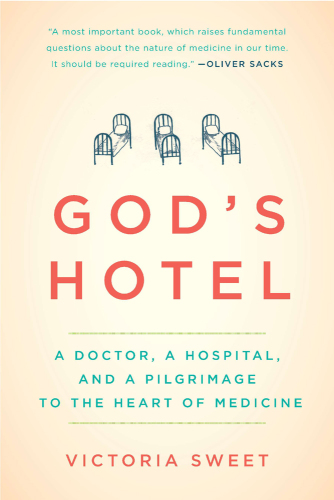
God's Hotel
A Doctor, a Hospital, and a Pilgrimage to the Heart of Medicine
یک دکتر، یک بیمارستان، و یک زائر قلب پزشکی،
کتاب های مرتبط
- اطلاعات
- نقد و بررسی
- دیدگاه کاربران
نقد و بررسی

December 15, 2011
A doctor's experiences in a unique corner of the medical world. At Laguna Honda Hospital in San Francisco, the doctors and nurses provide long-term care for the sick poor; the working and living environments are unlike that of any other hospital in the country. Physician Sweet accepted a job at Laguna Honda because they were willing to offer her a part-time position (extremely rare at the time), and she was interested in continuing to practice medicine while simultaneously pursuing a doctorate in the history of medicine. The author had come to realize that modern medicine did not mesh with her idea of being a physician, and she sought answers in the teachings of Hildegard of Bingen, a German nun who practiced medicine in the Middle Ages and who had, miraculously, penned a medical textbook. Laguna Honda turned out to be the perfect place to put many of Hildegard's ancient theories into practice. What was originally supposed to be a months-long stopover turned into a career spanning more than 20 years and countless life-altering realizations about the nature of medicine. Sweet writes of Laguna Honda with unguarded affection, but she doesn't gloss over the negative phases. She is remarkably honest about the darker side of her experiences at the hospital: the patients who couldn't be saved, patients whose bad behavior was openly tolerated (smoking, drinking, gambling, etc.), the political infighting among the staff and bad managerial decisions. In the dozen or so patient success stories, Sweet's warm, anecdotal style shines brightest. The author's compelling argument for Laguna Honda's philosophy of "slow medicine" will make readers contemplate if perhaps the body should be viewed more as a garden to be tended rather than a machine to be fixed.
(COPYRIGHT (2011) KIRKUS REVIEWS/NIELSEN BUSINESS MEDIA, INC. ALL RIGHTS RESERVED.)

Starred review from January 1, 2012
This is a remarkable, poignant portrait of a committed physician on a quest to understand the heart, as well as the art, of medicine. Laguna Honda Hospital, the last remaining almshouse in the United States--a therapeutic community that houses and cares for the chronically ill or impoverished--offers veteran physician Sweet (clinical medicine, Univ. of California, San Francisco) a unique education in ministering to the body, heart, and soul. Her experiences there inspired her to study medieval physician, poet, and abbess Hildegard of Bingen's alternative approach to medicine of advocating that the human body be nurtured like a garden. Ultimately, Sweet embraced the notion and practice of slow medicine, an approach at odds with the contemporary rush for efficiency, a misguided trend to which even Laguna Honda eventually succumbs. VERDICT A marvelous, arresting read for anyone interested in medical practice. Of particular appeal to aficionados of spiritual medical narratives such as Tracy Kidder's Mountains Beyond Mountains: The Quest of Dr. Paul Farmer, a Man Who Would Cure the World. [See Prepub Alert, 9/29/11.]--Lynne F. Maxwell, Villanova Univ. Sch. of Law Lib., PA
Copyright 2012 Library Journal, LLC Used with permission.

Starred review from December 1, 2011
Medical doctor Sweet's search for a position that would allow her to practice while earning a doctorate in the history of medicine brought her to Laguna Honda Hospital in San Francisco, the last almshouse for the poor and chronically disabled in America. Old-fashioned and plain, dilapidated and imperiled, its six spacious, many-windowed wings housing 1,178 patients were surrounded by 60 acres on a hilltop with an ocean view. Here Sweet came to profoundly appreciate and learn from resilient patients who survived poverty, addiction, abuse, and severe maladies. She also immersed herself in the writings of the brilliant twelfth-century German mystic and medical practitioner Hildegard of Bingen, conducting extensive research in Europe, and making the famous medieval pilgrimage to Santiago de Compostela. Sweet's diverse experiences engendered her commitment to what she calls slow medicine. Meanwhile, Laguna Honda came under siege, threatened first with burdensome bureaucracy, then with closure. But voter support led, instead, to a new building. Sweet's watershed book ambushes and transforms you with its visionary middle way between the irreplaceable skills of doctors and the benefits of holistic medical knowledge and twenty-first-century technology and standards. Vital, exquisitely written, and spectacularly multidimensional, Sweet's clinically exacting, psychologically discerning, practical, spiritual, and tenderly funny anecdotal chronicle steers the politicized debate over health care back to medicine and compassion.(Reprinted with permission of Booklist, copyright 2011, American Library Association.)

























دیدگاه کاربران